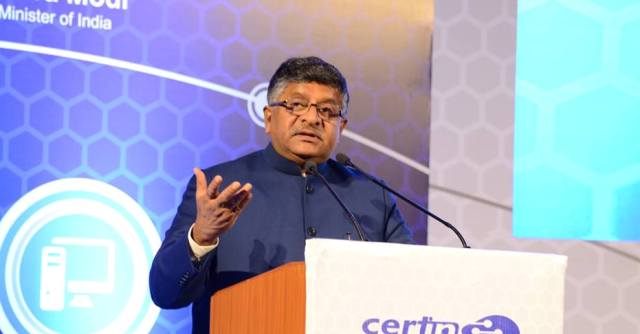
Right to Privacy a fundamental right but not absolute: Ravi Shankar Prasad
The Supreme Court's judgement which stated the Right to Privacy is a part of the Right to Life and Liberty appeared to be a blow to the government which argued that the individual privacy is not an inalienable fundamental right under Constitution.
However, while explaining the government's stand on the judgement by the top court, Prasad said: "The government has been consistently of the view that Right to Privacy shall be a fundamental right flowing from Article 21 and should be subject to reasonable restrictions."
While the top court ruled that Right to Privacy comes under the Right to Life and Liberty, guaranteed under Article 21 of the Indian Constitution, the verdict casts its shadow on the the mandatory use of Aadhaar, the national biometric identity card which has been challenged by many as an infringement of privacy.
Aadhaar has also been cited as a potent instrument that can cause breach of individual and personal data and hence susceptible to misused by companies.
Speaking about the cloud gathered around the legality of the Adhaar card, the present government attacked its immediate predecessor (Congress government) who were in power for making flaws while implementing the scheme.
In a statement, the government said: "The UPA Government had introduced AADHAR scheme without any legislative support. It was in that context that the question of the UPA’s AADHAR scheme was challenged before the judiciary."
"The NDA Government ensured that necessary legislation was approved by Parliament. Adequate safeguards were also introduced" the statement read.
In an attempt to defend the government, Prasad even reiterated finance minister Arun Jaitley's speech in the Parliament and said the Supreme Court upheld Jaitley words in the judgement.
"On 16.3.2016, while speaking on the AADHAR Bill in the Rajya Sabha, the Government through the Finance Minister, had clearly stated – “Is privacy a fundamental right or not? The present Bill pre-supposes and is based on the premise and that it is too late in date to contend that privacy is not a fundamental right. So, I do except that probably privacy is a fundamental right. It is contended and broadly it is now accepted that privacy is a part of the individual liberty”" Prasad stated.
Lashing out at Congress and the Left for criticising the government after the apex court's judgement on Thursday, Prasad questioned the accountability of the previous government which was led by the Congress. Highlighting the BJP's fight against the emergency rule called upon by the Congress government in 1970s, Prasad said: "This government (Narendra Modi government) is led by leaders who fought and suffered for all the freedoms which were debated during the emergency period."
He scoffed at the Congress vice-president for calling them "fascist" without homework like always, and said cyber and data security are being taken care of.
He said Aadhaar is an international benchmark and the Government has set up a high-powered committee for Data Protection, which the Supreme Court has taken note of.
The ruling on the highly contentious issue was to deal with a batch of petitions challenging the Centre's move to make Aadhaar mandatory for availing the benefits of various social welfare schemes.
The ruling BJP-led NDA says since Aadhar was implemented money is reaching the poor directly to their banks and no one can steal it like once "late Congress Prime Minister Rajiv Gandhi had said that if he sends one rupee to a beneficiary only 15 paisa reaches him."
The Supreme Court on Thursday overturned two previous judgements passed against the Right to Privacy in the years 1954 and 1962.
A nine-judge bench, led by Chief Justice JS Khehar, unanimously passed the verdict. The other judges included J Chlameswar, SA Bobde, RK Agarwal, RF Nariman, AM Sapre, DY Chandrachud, SK Kaul and S Abdul Nazeer.
However, the question on the legality of the Aadhaar Card, the biometric ID card, which still persists will be decided by a smaller bench on the basis of Thursday's judgement on Right to Privacy.
The legality of the Aadhaar Card has been put to question, particularly after Thursday's judgement, as it accesses biometric details of individuals.
Already crores of Indians have acquired the cards.
The legal battle regarding Right to Privacy was initiated following the previous government's (UPA government) decision to introduce the Aadhaar Card.
As the Supreme Court came out with the judgement, opposition leaders saluted the judiciary, describing the verdict as "path breaking and a great victory for liberty and freedom."
Support Our Journalism
We cannot do without you.. your contribution supports unbiased journalism
IBNS is not driven by any ism- not wokeism, not racism, not skewed secularism, not hyper right-wing or left liberal ideals, nor by any hardline religious beliefs or hyper nationalism. We want to serve you good old objective news, as they are. We do not judge or preach. We let people decide for themselves. We only try to present factual and well-sourced news.







